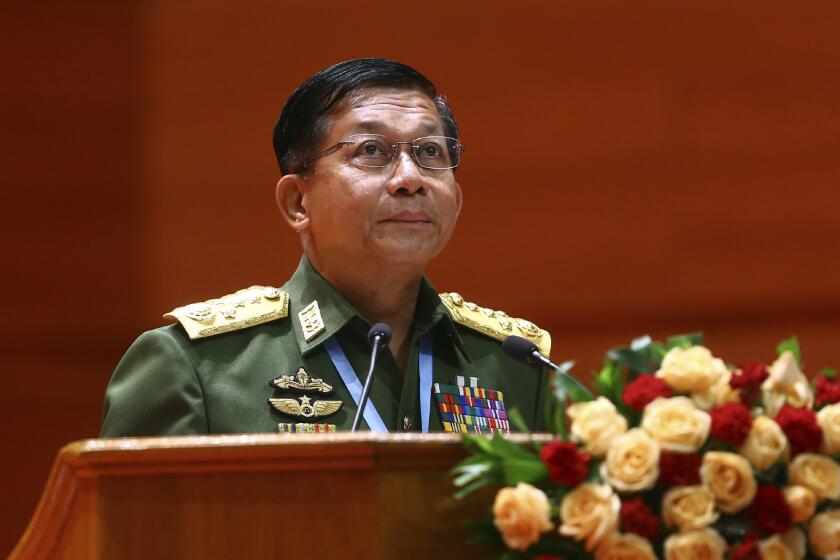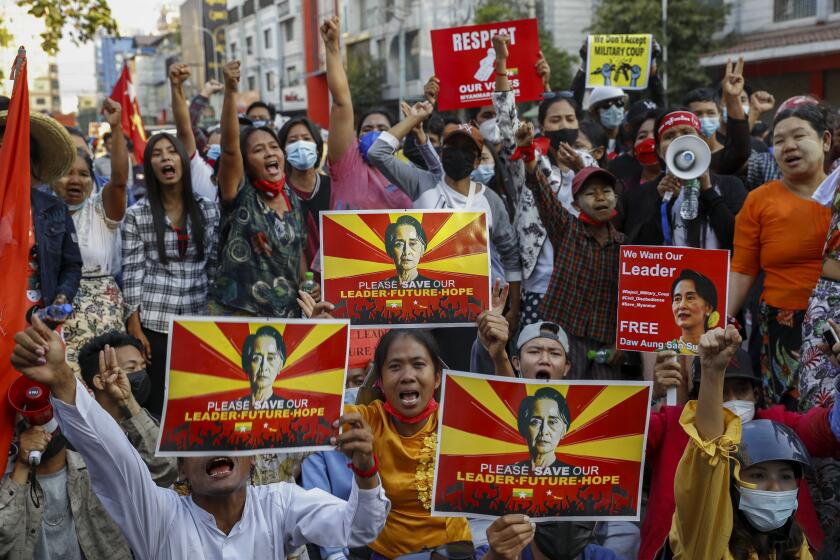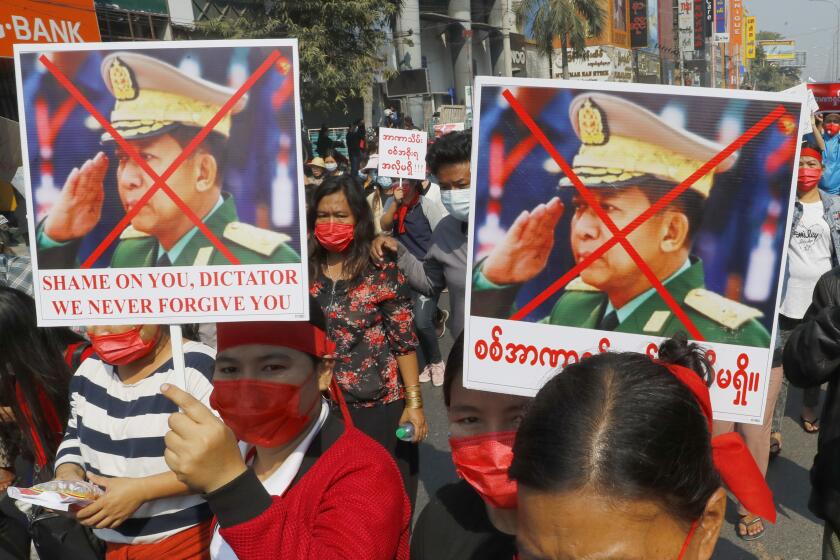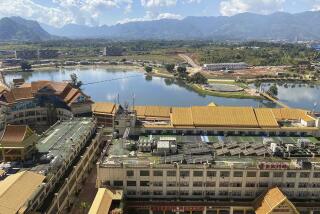Supporters of military government in Myanmar attack, injure anti-coup protesters
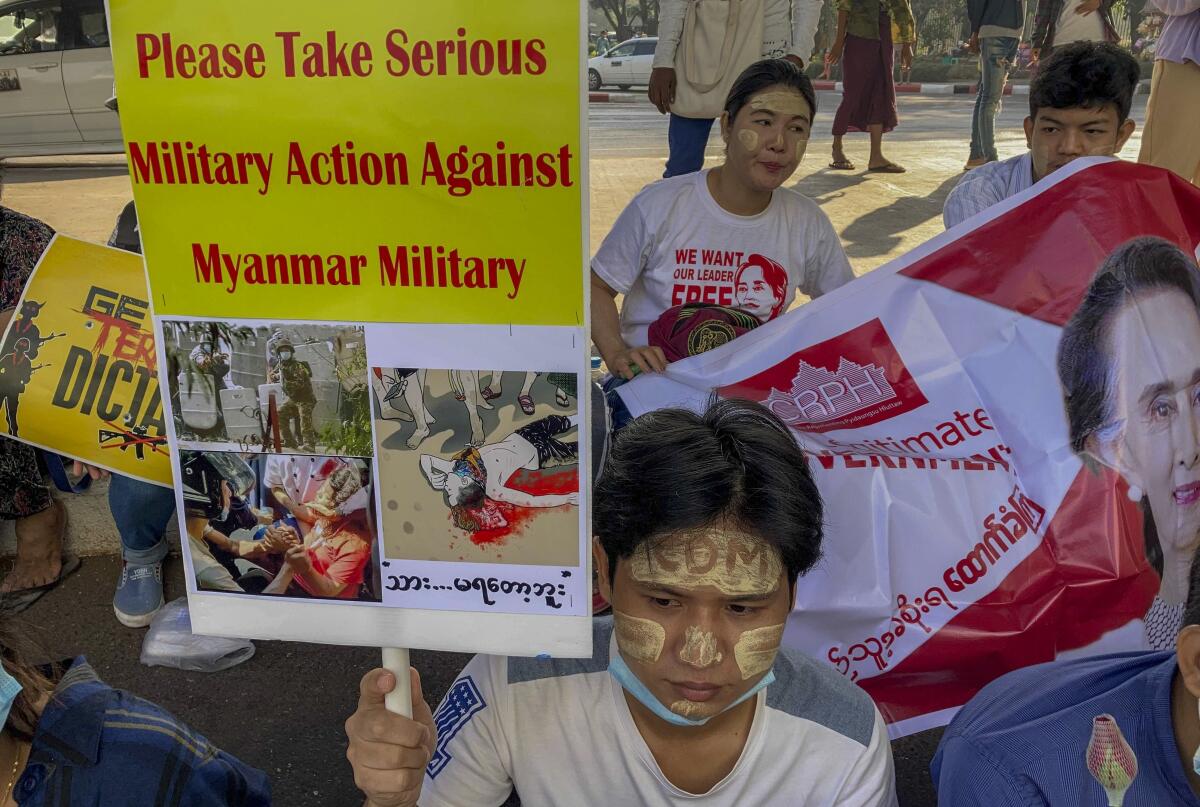
- Share via
YANGON, Myanmar — Supporters of Myanmar’s ruling junta used slingshots, iron rods and knives Thursday to attack protesters demanding an end to the military government that took power in a coup. Several demonstrators were injured.
The violence complicates an already intractable standoff between Myanmar’s army and a protest movement that has been staging large rallies daily to demand that Aung San Suu Kyi’s elected government be restored to power. She and other politicians were ousted and arrested in a Feb. 1 takeover that shocked the international community and reversed years of slow progress toward democracy.
At least three people have been killed amid anti-military protests across the country.
Meanwhile, Facebook — one of the primary modes of communication in Myanmar — announced Thursday that it would ban all accounts linked to the country’s military as well as ads from military-controlled companies, in a reflection of the international outrage over the takeover.
Tensions escalated on the streets between anti-coup protesters and supporters of the military. Photos and videos posted on social media showed groups attacking people in downtown Yangon as police stood by without intervening.
The number of people injured and their conditions was not immediately clear.
Myanmar’s military already held vast economic and political power. Now it has to govern a country grappling with health and economic crises.
According to accounts and photos posted on social media, hundreds of people marched in support of the coup. They carried banners in English with the slogans “We stand with our defense services” and “We stand with State Administration Council,” the official name of the new ruling junta.
When the marchers were jeered by bystanders near the Yangon’s Central Railway station, they responded by firing slingshots, throwing stones and then chasing down the onlookers. One band that broke away stabbed and kicked a man they had chased. Video shows there had been both pro- and anti-coup crowds near the station Thursday.
Supporters of the military have gathered in the streets before, especially in the days immediately before and after the coup, but had not used violence so openly.
Critics of the military accuse it of paying people to engage in violence, allegations that are hard to verify. Such allegations have been raised during earlier spells of unrest, including a failed anti-military uprising in 1988 and an ambush of Suu Kyi’s motorcade in a remote rural area in 2003, when she was seeking to rally her supporters against the military regime then in power.
Staged car breakdowns, blocked railway tracks and civil servant strikes are putting pressure on the junta and raising fears of a harsh crackdown.
The confrontations could make it harder to resolve Myanmar’s crisis.
Indonesian Foreign Minister Retno Marsudi visited Bangkok on Wednesday and held talks with her Thai counterpart and Myanmar’s new foreign minister, who also traveled to Thailand. The meeting was part of Marsudi’s efforts to coordinate a regional response to the crisis triggered by the military takeover in Myanmar.
Indonesia and fellow members of the Assn. of Southeast Asian Nations are seeking to promote some concessions by Myanmar’s military to help prevent more violence. The association, to which Thailand and Myanmar also belong, says that dialogue with Myanmar’s generals is more effective at achieving concessions than more confrontational methods, such as the sanctions often advocated by Western nations.
In a news conference after her return to Indonesia, Marsudi said she expressed her country’s concern about the situation in Myanmar.
Analysts say the military takeover threatens an internationally backed peace process aimed at ending ethnic insurgencies.
“We asked all parties to exercise restraint and not use violence . . . to avoid casualties and bloodshed,” she said, emphasizing the need for dialogue, reconciliation and trust-building.
Marsudi said she had conveyed the same message to a group of elected members of Myanmar’s parliament, who were prevented by the military coup from taking their seats. The lawmakers were from Suu Kyi’s National League for Democracy, which won a landslide victory in elections last November that would have given it a second five-year term in office.
After the coup, the group of lawmakers, calling itself the Committee Representing Pyidaungsu Hluttaw, the name of the combined houses of parliament, announced that it was convening the body in an online session and appealed to the U.N. and foreign countries to treat it as Myanmar’s legitimate government.
It has received mounting support from Myanmar’s protest movement but few, if any, foreign endorsements. Indonesia’s acknowledgment that the group has a role to play could open an avenue for negotiations between Myanmar’s ruling junta and its opponents.
Breaking News
Get breaking news, investigations, analysis and more signature journalism from the Los Angeles Times in your inbox.
You may occasionally receive promotional content from the Los Angeles Times.
Facebook said it was banning military-linked accounts and ads because it was treating the situation in Myanmar as an “emergency.” The social media giant has already banned several military-linked accounts since the coup, including army-controlled Myawaddy TV and state television broadcaster MRTV. The bans are also being applied on Instagram, which Facebook owns.
Facebook and other social media platforms came under enormous criticism in 2017 when rights groups said they failed to act sufficiently to stop hate speech against Myanmar’s Muslim Rohingya minority. The army launched a brutal counterinsurgency operation that year that drove more than 700,000 Rohingya to seek safety in neighboring Bangladesh, where they remain in refugee camps.
Facebook in 2018 banned the accounts of several top Myanmar military leaders, including Senior Gen. Min Aung Hlaing, who led this month’s coup that ousted the elected government of Suu Kyi and her National League for Democracy party. The general heads the junta that now rules the country.
The junta has tried to block Facebook and other social media platforms, but its efforts have proven ineffective. For more than a week it has also turned off access to the internet nightly from 1 a.m.
More to Read
Sign up for Essential California
The most important California stories and recommendations in your inbox every morning.
You may occasionally receive promotional content from the Los Angeles Times.
